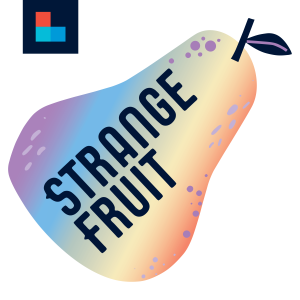
Strange Fruit #195: After 18 Years, Hip-Hop Feminist Joan Morgan Is Still Breaking It Down
 2017-05-05
2017-05-05
Download
Right click and do "save link as"
"When Chickenheads Come Home to Roost: A Hip-Hop Feminist Breaks It Down" came out in 1999. It was the age of the video vixen, and feminists were decrying the objectification of women in hip-hop imagery and lyrics.
Then Joan Morgan published her groundbreaking book examining the complexities of life as a black woman, feminist, and music lover in the age of hip-hop.
This year, the book turns 18. Last month, a new edition was published with a forward by Brittney Cooper and an afterword by Treva Lindsey. It's also just been released as an audio book, read by actor Joy Bryant. It's clearly a work with enduring relevance, but its initial reception wasn't all positive.
"There were a lot of elder feminist stateswomen who basically just dismissed the book as, 'this person is not really a feminist because if she was really a feminist, she couldn't possibly love hip hop,'" Morgan says.
"So finding my tribe years later - the people who actually find value in the book, has been such a precious gift to me. It's incredible to me that it still has a place in the culture."
One member of that tribe is our own Dr. Kaila Story, who first read "Chickenheads" as a college senior.
"It made me confirm that I belong in feminism," Doc says.
"That I am a feminist. That I can bring my whole self, my entire self, to the professoriate, to my classes, and to the work that I do."
Joan Morgan joins us this week to talk about what's changed in black feminism between now and 1999 — and what still needs to.
view more
More Episodes
Strength, Survival, And Black Families
 2020-09-29
2020-09-29
 2020-09-29
2020-09-29
'Kitchen Table Wisdom' For And From Gay Men
 2020-09-19
2020-09-19
 2020-09-19
2020-09-19
Interracial Household Dynamics In 2020
 2020-09-11
2020-09-11
 2020-09-11
2020-09-11
Young Adult Fiction Author Arvin Ahmadi
 2020-09-03
2020-09-03
 2020-09-03
2020-09-03
'The Chi' Star Jasmine Davis
 2020-08-26
2020-08-26
 2020-08-26
2020-08-26
In Praise Of Quiet Allies
 2020-08-19
2020-08-19
 2020-08-19
2020-08-19
Interrupting Our Own Unconscious Biases
 2020-08-03
2020-08-03
 2020-08-03
2020-08-03
Loving Black People, Loving Black History
 2020-07-29
2020-07-29
 2020-07-29
2020-07-29
Live Streaming The Revolution
 2020-07-15
2020-07-15
 2020-07-15
2020-07-15
The Role Of New Media In Protest Coverage
 2020-07-07
2020-07-07
 2020-07-07
2020-07-07
Celebrating Pride Online
 2020-06-25
2020-06-25
 2020-06-25
2020-06-25
Breaking Stereotypes One Storybook At A Time
 2020-06-16
2020-06-16
 2020-06-16
2020-06-16
The Death Of Breonna Taylor
 2020-05-28
2020-05-28
 2020-05-28
2020-05-28
012345678910111213141516171819
Create your
podcast in
minutes
- Full-featured podcast site
- Unlimited storage and bandwidth
- Comprehensive podcast stats
- Distribute to Apple Podcasts, Spotify, and more
- Make money with your podcast
It is Free
- Privacy Policy
- Cookie Policy
- Terms of Use
- Consent Preferences
- Copyright © 2015-2024 Podbean.com




